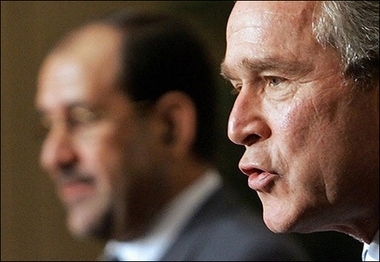Bush: Iraq progress too slow
(AP)Updated: 2006-12-05 08:47
Bush spoke with al-Hakim directly about Iran and Syria and the critical need for them to respect Iraqi sovereignty and stop destructive activity that undermines Iraq's unity government, a senior administration official said. He spoke on condition of anonymity because he was not authorized to divulge details of the meeting.
The official said it wasn't known whether al-Hakim specifically asked Bush to enlist Iran's assistance. Al-Hakim told reporters that he vehemently opposes any regional or international effort to solve Iraq's problems that goes around the unity government in Baghdad.
|
"We reject any attempts to have a regional or international role in solving the Iraqi issue," the cleric, who speaks Arabic, said through a translator. "We cannot bypass the political process. Iraq should be in a position to solve Iraqi problems."
Later, in a speech at the US Institute of Peace in Washington, al-Hakim said Iraq is interested in creating good relations with all neighboring nations, including Kuwait, Saudi Arabia, Turkey, Iran, Syria and Jordan.
But he said: "We do not want to distribute shares of power to neighboring countries, but rather we want balanced relations."
Al-Hakim said he talked with Bush about equipment, including armaments, that the Iraqi security forces need. He pledged that the government would deal with all forms of terrorism, no matter where they originate.
He also said that eliminating the danger of civil war in Iraq can be achieved only by decisive strikes against terrorist Baathists and extremist followers of Islam. "Otherwise we will continue to witness massacres being committed every now and then against the innocent Iraqis," he said.
Monday's developments came amid rising expectations about a new US policy that Bush is crafting for Iraq - one that his advisers say will be announced within weeks. He is seeking information from reviews being done by the State Department, National Security Council and the Joint Chiefs of Staff as well as the Iraq Study Group, led by former Secretary of State James A. Baker III and former Democratic Rep. Lee Hamilton of Indiana.
It became increasingly clear that the administration was looking for Iraq alternatives well before the November elections, when Bush was adamantly defending his policies.
A day before the elections, Defense Secretary Donald H. Rumsfeld wrote a letter saying he had developed a list of alternative approaches for Iraq over a period of weeks. In his letter, obtained by The Associated Press on Monday, Rumsfeld said he and Gen. Peter Pace, chairman of the Joint Chiefs of Staff, had told the president "a number of weeks ago" that they were considering alternatives for Iraq policy because changes were needed.
Rumsfeld also wrote that at his request, Gen. John Abizaid, the top commander for US forces in the Middle East, had assembled a group to work on the issue.
 | 1 | 2 |
|
||
|
||
|
|

